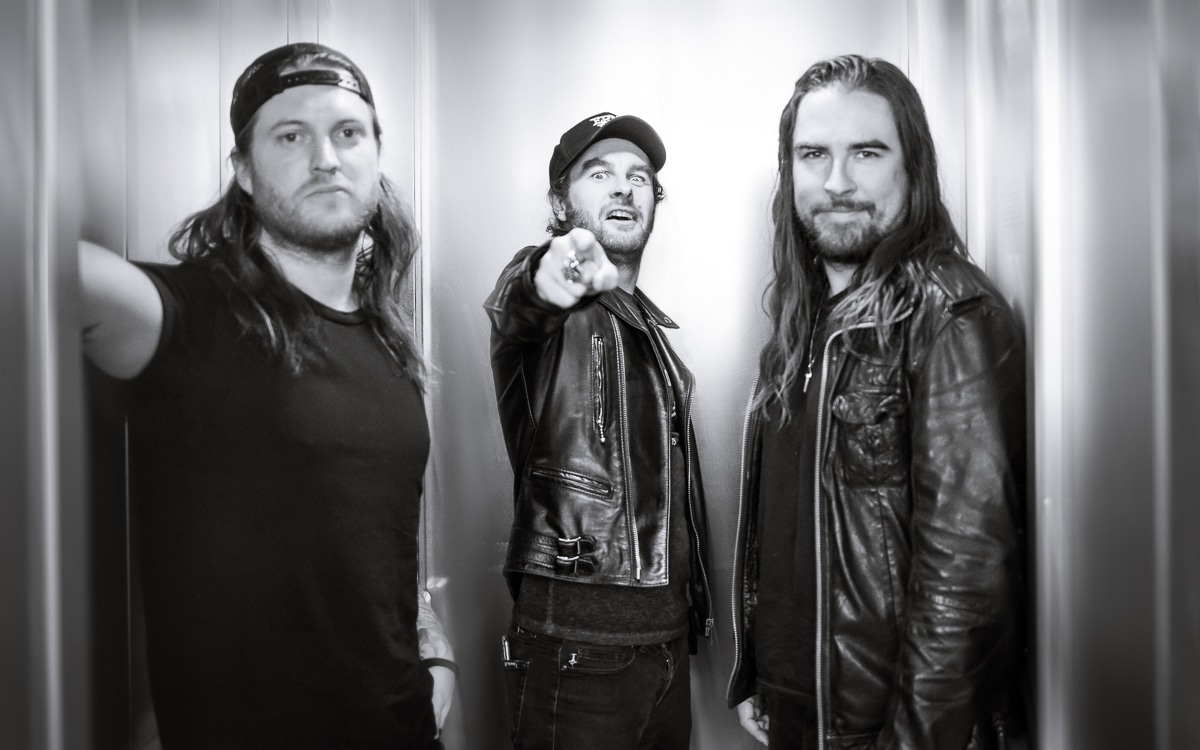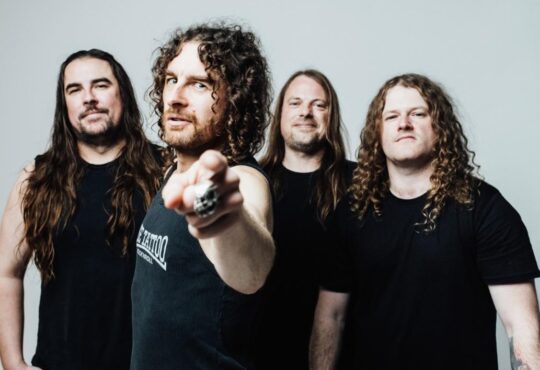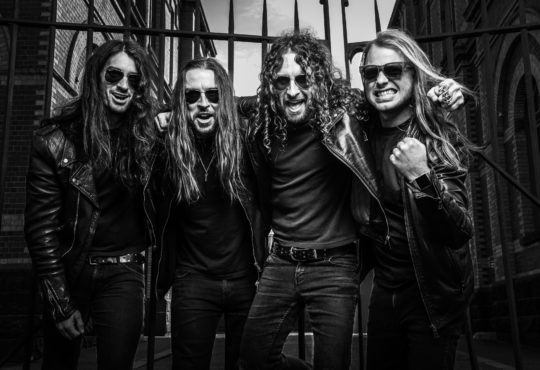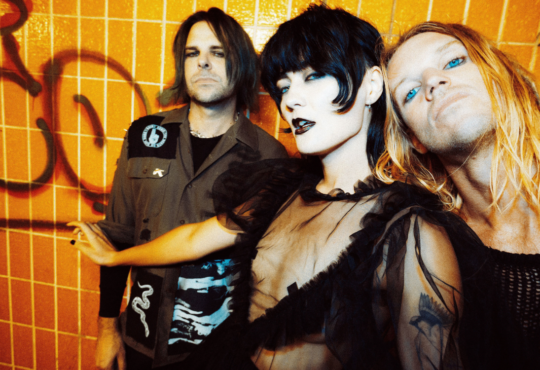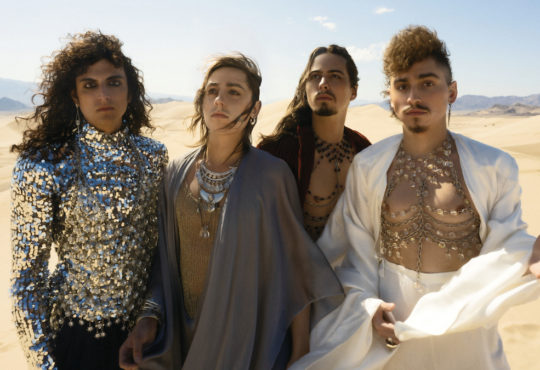The rock n’rolling Australian machine is on its way! Ready to kick some major asses all over the world. Airbourne introduces “Boneshaker”, so get ready coz’ they’re ready!
Hi Joel! Your new record will be out while already on tour, here in Europe. Isn’t it kind of weird?
Joel O’Keeffe (vocals/guitar): It happened before. I think it almost happened with every record. We never wait to release a record and the go on tour. We just can’t wait to play. We even started to play the single before it was out. It was on YouTube before we actually released the track. That’s something different I guess but hey, what are you gonna do?
First, what’s the deal with the title? Why “Boneshaker” and not “Bonecrusher” for example, which could fit your energetic music.
Joel: The song behind the title, we just roll the vibe of that song while mixing. It was the first song we tracked but when we heard its mix, it kind of brings all the elements of the record together. We don’t even think but later on: “fuck we need a title”. It was the first song on the list and it creates its own vibe, a sort of a leading thing and it just came along.
This time you went to Nashville and work with Dave Cobb. Was the your number one choice? How did that happen?
Joel: He was the number one choice. We wanted to work with him for a while. When we called him on the phone, we talked about a lot of classic rock n’roll in terms of the era of the mid 70s to the late 70s. We talked about AC/DC, Led Zeppelin, Black Sabbath and the whole vibe. “We need to get rid of all the computer shit and go to the tape machine, just get in a room and get rockin'” “Hey man, let’s do it!”.
But why him in particular?
Joel: Because he’s done not much rock n’roll stuff and after the phone call he told, straight way, that he loves rock n’roll. And even before the phone call, he was in a band, he produced, called Black Robot, and there’s the song called “Badass” and they did a cover from JJ Cale song “Cocaine”. Based on the guitar tone of that and the vocals, that’s where we want to get.
Was it all about tape recordings again? We can feel some blow or little noises. Was it again a desire to make it sound authentic?
Joel: When we do a take of the song, we did take 1 with the whole band playing all way through. We’ll do a second take if we needed to or a third. Based on that, Cobb’s thing was “I really like the second take” or the first, “that’s where the energy is but we need the solo to be better so lets do some more takes”. Then he’ll say that the third one has the best solo so he’ll cut the tape, put the solo over take 1, and then that’s it. We didn’t check for little things that you can hear and part of that too is that before modern recording, with ProTools, that’s the way it was done. We didn’t think of: “it’ll feel better” and now, I’m still hearing shit. “Oh I can hear this and that”, laughing going on, yeah.
Once, Dave said “Number one is the voice. That’s what people respond to the most, the singer is everything”. Did he have a new approach or new tips for you while tracking? A new vision if you look back to your previous works.
Joel: He did and his thing was… he just get you in the vibe. I don’t know, he’s a bit of a magician. “Go for it man!”. Instead of being in a vocal booth, with a door and headphones, he turned up the monitors and made me comfortable. No one let me do that with the speakers at the desk. “Lets do it that way, that’s the way Queen did it” and some bands do it this way. So we had the microphone in the control room, turned it up, and just went for it. We sometimes did a few takes, sometimes not. Or we reworked some parts like the chorus. So we did it that way.
But did you feel that it has an impact on your performance and the final result?
Joel: Yeah. It’s hard being a singer and hear your own voice, it’s always weird. But I can see what he did. He got more character, more honesty. We didn’t double anything. In the past I’d always double the vocals. On this record, there was none.
You first released the title track, what’s that about? Why this one first?
Joel: Sex! That’s what it’s all about! (laughs) Doing it right there on the spot. No fucking around, getting straight to it. That’s what “Boneshaker” is. (laughs)
So same thing with “Backseat Boogie”. The chorus is pretty catchy!
Joel: Yes, the same thing in the backseat of a car. (laughs)
But do you overthink your lyrics?
Joel: No and that’s fun. We draw from real, memories and experiences. There’s a line in that song that says: “at the top of the hill, above the city lights”. Every time I’m thinking of Warrnambool, where we’re from, over Cannon Hill, it doesn’t really look over the city lights but it’s always the lookout if you go up there with a girl. And yeah. (laughs) So you use your memories and put them in the song. It’s real stuff. Plus there’s another line in there where I say: “cheap bottle of wine” and it’s a reference to the first record because we like when bands like Iron Maiden reference stuff from their previous records.
How do you match the topics with the music?
Joel: The vibe. What it feels. We were doing “Backseat Boogie” we were feeling like: “this riff feels like we’re in a car, driving into Warrnambool, going to Cannon Hill, with a girl in the front seat” and then it becomes just what it is.
Is it always the same process? Like you have the riffs first and lyrics after.
Joel: Yeah. It’s usually the riffs first. But while we’re on tour or something, I’m still writing down lyric ideas either in a book or on my phone. It’s always cool, when you get a riff and listening to it, going over your song titles and find something suiting it. Then you write everything around that.
What about “Switchblade Angel”? The shortest track but one of the speediest ones.
Joel: It was one take, that’s why it’s so short. It’s about empowering females. If you’re about to mess with these chicks, they’ll put a knife in you. When the whole Weinstein case went all over. If you mess with the wrong girl, she might put a knife and you’re done.
The only longer and smoother track is “Weapon Of War”. It looks like a more serious matter than just rock, chicks and parties.
Joel: Yeah, I mean part of it is a post-traumatic stress that comes from being overseas at war and coming home after seeing all those horrific stuff. Once back, they’re not even considered in their own country. The other half of that song is the threat of nuclear war. We were in Australia when the North and South Korea case getting pretty big. Even in Australia, the newspapers were like: “Is today gonna be THE day?”. That’s where that song came from. The riff felt right to that.
But do you have the desire to write a bit more about serious subjects other than rock n’roll, girls and parties?
Joel: Yeah, everything was the vibe. There was an homeless man at the corner, outside of the studio. We would walk from the hotel for about 15 minutes and we’ll pass him on the corner. He would always sell his magazines. That’s what they do in Nashville, they give homeless people a job and one of those jobs is to sell the local paper. I’d buy the paper from him every two weeks, on Wednesday. So I bought it that day, went to the studio, and what I remember is that double page on the post-traumatic stress of troops coming home from war and how they deal with it.
Something America should do more, and Australia is the same. Every country is the same. That two-page thing and then we had the riff and that simply felt like that. Dave was always talking about the Cold War era, students in America had to go through drills and hide under their desks, pretending nuclear bombs were coming from Russia. Those two things got together for that song.
It was Harri’s first studio experience with the band. How was he? What was his input for this record?
Joel: He’s got a lot of enthusiasm, for one. And we were mates for at least ten years before he joined the band. We grew up listening to the same stuff and talk about the same bands. When it came to work on the songs, his influences are the same. He loves the same stuff and through his enthusiasm I guess it’s something that really helps and drives as well. We didn’t really have to sit down and explain stuff. It wasn’t about “doing the Airbourne thing” because he already knows Aussie rock n’roll. When he joined our band, he also went out on the road with us first, for almost a year. Having that and recording the album, I think it was great. He also brings a great sense of humor too.
Fans are waiting for a new “Airbourne album” being another “Airbourne album”. But what can they expect from it? New or surprising elements for example.
Joel: If you loved this far, you’re gonna love this one. It’s really raw. I guess the most surprising element we may have never done before is really strip it right back, so you can hear all those little things, we’ve left a lot of mistakes. Things that could have been defined as uglinesses on other records. It’s all live, it’s all there.
What’s your definition of a good rock n’roll song?
Joel: One that actually want you to pump your fist and forget about the world. You’re in your head and you’re having a great time.
It’s “Highway To Hell”‘s fortieth anniversary. What does it represent for you?
Joel: I love “Shot Down In Flames”, it’s probably one of my favorite AC/DC songs. But the fortieth anniversary is also Bon Scott’s last record, the first one with Mutt Lange (producer) and before Mutt has done this record, he was a country producer.
Part of doing this record, Cobb worked with Rival Sons but he hadn’t really done a heavy rock n’roll band, he’s done Europe, it was like Mutt in a way. A big country producer having us. We thought of that, little universes getting in line.
“Highway To Hell” (1979) to me, it’s an album of just pure freedom.
You’re the frontman: you sing, play, jump, climb, smash beers, go into the crowd. Why and how did you become this kind of performer? Who influenced you?
Joel: I found out recently that I have ADHD (ie: attention-deficit hyperactivity disorder), so that might make sense for that stuff and I didn’t know I was an hyperactive person but in school, it made sense. When I look back, I never paid attention, always fidgeting. I guess I’m always trying to do something new when I get out there.
I think watching bands as a kid, like AC/DC or Iron Maiden with Bruce Dickinson running around. But also Evel Knievel do stunts. I wanted to be a stuntman but I wanted to play guitar. I like action movies too. All those little things combined made me.
Tyler Bryant & The Shakedown are opening for you in the UK and in some EU cities like Germany and stuff. What do you think of their music?
Joel: Great! Man they’re so good. They’re really talented and got a real vibe. I know it’s gonna go great with the crowd, it’s rock n’roll. People coming to those shows will get a full night of rock n’roll. And I’m looking forward to watching them play because they really are talented.
Three years ago, we asked Ryan this question: isn’t it sometimes hard to work with your brother? What’s your answer? (laughs)
Joel: Oh you know we always have arguments and stuff but the fact that we’re blood makes it stronger. The band has a strong core. Those times when you’re in a band, your core believes could be questioned. When you got your brother there, it’s like: “they coming after the family now”. That’s different. We’re a band of brothers as well, with Harri and Justin. It’s good in that way.
Finally, we are “RockUrLife”, so what rocks your life Joel?
Joel: What rocks my life is, of course, rock n’roll. (laughs) Those bands would be: AC/DC, Motörhead and Iron Maiden. I could keep going. (showing the Hard Rock Cafe’s Hendrix vest) Of course him too and I’d like to wear that, could be cool! (laughs) Apart from that, I like action movies, my fiancée Claire and my dog Rosalie. (laughs)
Airbourne was in Paris for a double headliner at La Cigale, throwback to their first show right here!
Website: airbournerock.com



